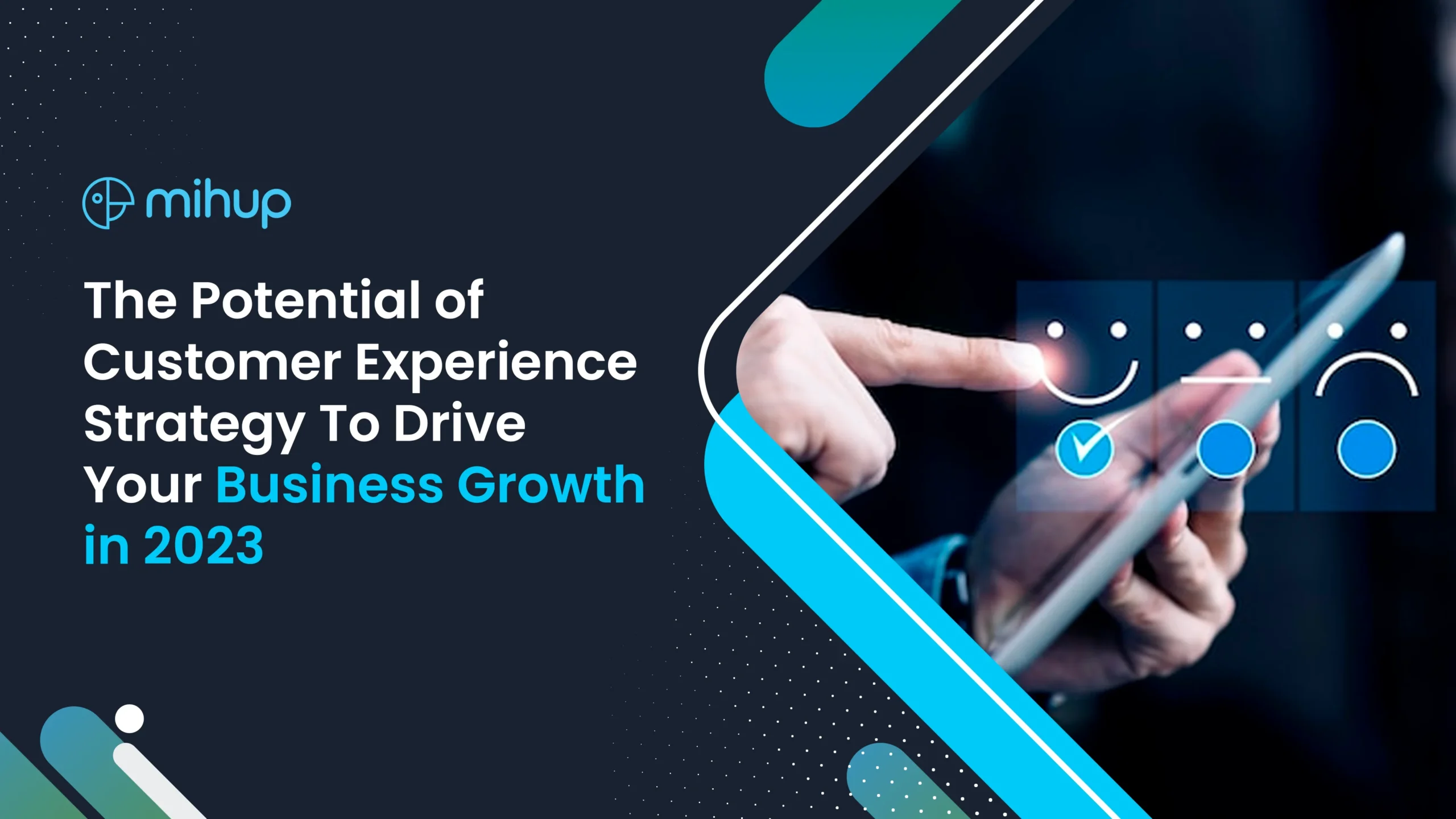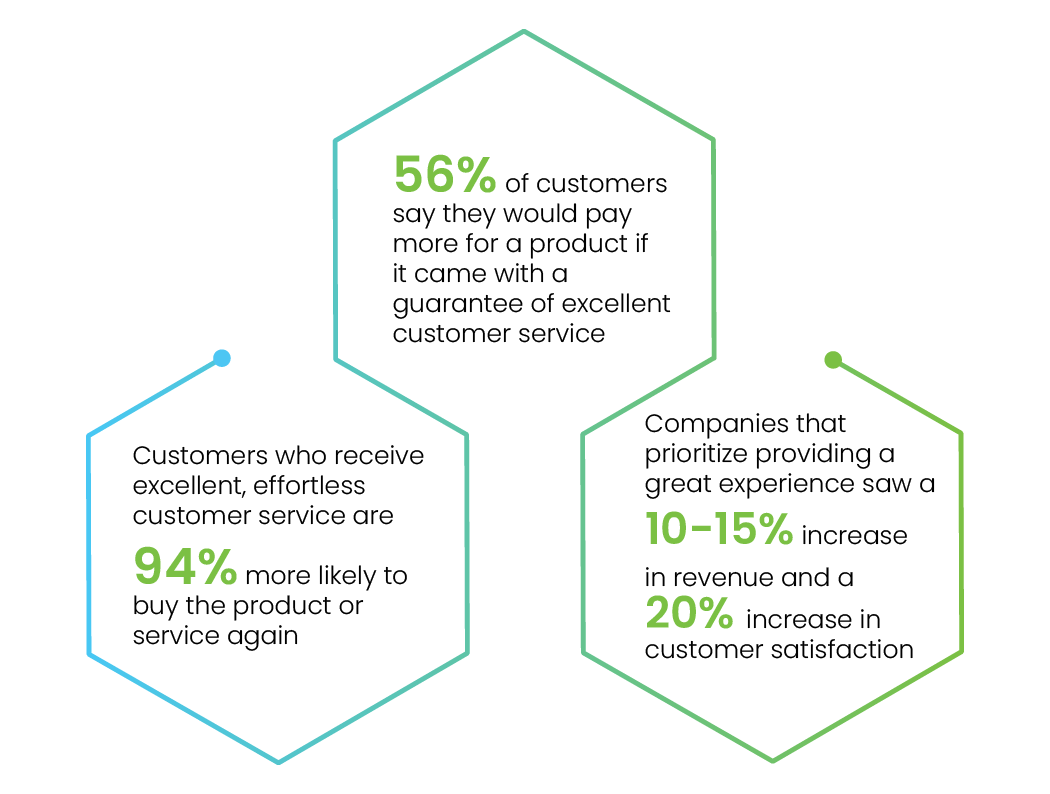The ability to provide an exceptional customer experience (CX) has emerged as a crucial factor that sets companies apart across all industries. Merely offering products or services is no longer sufficient; customers now seek a personalized approach that addresses their specific needs and preferences.
According to a recent study conducted by Salesforce, 84% of customers consider the experience a company offers to be equally important as the quality of its products and services. Therefore, in 2023, it is imperative for businesses to develop a focused customer experience strategy that adapts to the evolving demands and expectations of their clientele.
This requires moving beyond conventional customer service methods and utilizing data-driven insights to deliver tailored experiences that deeply resonate with each individual customer.
Whether you are a business owner, marketer, or customer service professional, this guide will furnish you with the necessary insights and knowledge to craft exceptional customer experience strategies that will drive success for your enterprise.
What is Customer Experience?
Customer experience (CX) refers to the overall perception and impression that a customer has of their interactions with a business or brand throughout their entire journey. It encompasses all the touchpoints and experiences a customer encounters, starting from the initial contact with the company, through the purchasing process, and extending to any post-purchase interactions or support they receive.
Customer experience includes various aspects, such as the quality of products or services offered, the level of customer service provided, the ease of navigating the company’s website or other platforms, and the overall reputation and image of the brand.
Customers who receive excellent, effortless customer service are 94% more likely to buy the product or service again. Source: Gartner
56% of customers say they would pay more for a product if it came with a guarantee of excellent customer service. Source: ArenaCX
Companies that prioritize providing a great experience saw a 10-15% increase in revenue and a 20% increase in customer satisfaction. Source: McKinsey
A positive customer experience is vital for businesses as it can lead to increased customer satisfaction, loyalty, and advocacy. On the other hand, a negative experience can result in customer dissatisfaction, loss of trust, loss of revenue, and potential damage to the company’s reputation.
A 1-point increase in customer experience score can result in an $823 million increase in revenue for a Fortune 100 company.
In today’s fiercely competitive digital marketplace, businesses that do not provide a positive customer experience run the risk of losing customers to their competitors who prioritize it. As per Oracle’s global CX research, 74% of senior executives believe that customer experience directly impacts customer loyalty. Hence, it is wise to carefully strategize your CX solution and stay updated with the latest CX trends to ensure success and customer satisfaction.
Customer Experience vs Customer Service
Customer Experience Strategy and Customer Service are related concepts, but they have distinct differences. Here’s how they set apart:
Definition
Customer service focuses on the specific interactions occurring between a customer and a company representative when the customer seeks assistance with a product or service. On the other hand, a Customer Experience Strategy entails the entirety of a customer’s interactions with a company across all touchpoints and channels, covering pre-purchase, during-purchase, and post-purchase stages.
Focus
Customer service primarily concentrates on resolving a particular problem or addressing a specific need that the customer has at that moment. In contrast, the Customer Experience Strategy aims to create an overall positive impression of the company, its products or services, and enhance the customer’s entire experience.
Scope
Customer service is often reactive, responding to customer needs as they arise. In contrast, the Customer Experience Strategy adopts a proactive and strategic approach, encompassing all the efforts a company makes to attract, engage, and retain customers throughout their journey.
Metrics
Customer service performance is commonly assessed using metrics such as response time, issue resolution rate, and customer satisfaction scores. On the other hand, Customer Experience Strategy is gauged through metrics like customer loyalty, repeat business, and lifetime customer value.
While customer service is undoubtedly a crucial aspect of the overall customer experience, it represents just one element of the larger picture. Customer Experience Strategy involves managing all customer interactions, from the initial touchpoint to the final engagement, with the goal of leaving a positive and lasting impression of the company and its brand. To stay ahead, businesses should keep up with key call center trends and employ innovative CX strategies to deliver exceptional solutions.
Key Ingredients of a Great CX Strategy
- Personalisation: Customers highly value a personalized experience that caters to their unique needs and preferences. This entails personalized product recommendations, tailored messaging, and exclusive offers.
80% of business leaders say customers spend more when they get a personalized experience. Source: Segment
- User-Friendly: Customers seek an effortless and seamless experience, whether they are navigating a website, placing orders, or seeking customer support.
- Swift and Efficient: Customers prioritize speed and efficiency, be it a quick checkout process, prompt responses to inquiries, or timely product deliveries.
- Empathetic and Relatable: Customers want to feel understood and acknowledged. They appreciate companies that take the time to actively listen, empathize with their concerns, and offer practical solutions.
- Consistent: Customers expect consistency across all touchpoints and channels, encompassing messaging, branding, and the quality of customer service provided.
- Proactive: Anticipating customer needs and addressing potential issues before they escalate is highly valued by customers.
- Open Communication: Customers appreciate follow-up communication after a purchase or interaction. This may include thank-you emails, surveys, or special offers to further enhance their experience.
63% of customer service teams use text messaging, compared to 78% of customers who use text messaging for communicating with a company. Source: Salesforce
What Makes Customer Experience Strategy Critical?
Today, the importance of a customer experience strategy has witnessed exponential growth due to several factors:
- Intensified Competition: In the current global economy, the business landscape is fiercely competitive, necessitating companies to distinguish themselves in crowded markets. A well-crafted customer experience strategy becomes a valuable differentiating factor.
- Influence of Social Media: Empowered by social media, customers now possess a powerful voice that enables them to instantly share their experiences. A positive customer experience strategy can lead to favorable reviews, recommendations, and referrals, while a negative one can quickly tarnish a company’s reputation.
- Elevated Customer Expectations: Modern customers hold high expectations, seeking a seamless and personalized experience across all touchpoints and channels. Companies must anticipate and fulfill their needs and preferences to stay competitive.
- Loyalty and Retention: An effective customer experience strategy fosters customer loyalty and retention. Satisfied customers are more inclined to return and recommend the company to others, enhancing long-term business success.
- Revenue Growth: Positive customer experiences directly contribute to revenue growth. Happy customers are more likely to make repeat purchases and increase their spending with the company over time, bolstering overall profitability.
5 Reasons CX Strategy is the Key to Achieving Your Business Goals
A customer experience strategy holds the key to accomplishing your business goals due to several compelling reasons:
- Customer Satisfaction and Loyalty: When customers have a positive experience with your company, they become more satisfied and loyal. This fosters repeat business, positive word-of-mouth referrals, and an increase in customer lifetime value.
- Differentiation: In a crowded and competitive marketplace, an exceptional customer experience strategy sets your business apart. It helps you stand out from rivals and attracts new customers to your brand.
- Revenue Growth: Satisfied and loyal customers tend to spend more money with your company over time. This consistent patronage leads to revenue growth and enhanced profitability.
- Cost Savings: An effective CX strategy can also lead to cost savings. Satisfied customers are less likely to seek assistance or return products, reducing customer service costs and improving operational efficiency.
- Brand Reputation: A tailored customer experience strategy elevates your brand reputation and increases brand awareness. This, in turn, creates more opportunities for business growth and expansion.
Prioritizing a customer experience strategy is of utmost importance in achieving your business goals. It results in increased customer satisfaction and loyalty, differentiation in a competitive market, revenue growth, cost savings, and a stronger brand reputation. By focusing on customer experience, you lay a solid foundation for long-term success.
Methods to Enhance Your Customer Experience Strategy
Enhancing your customer experience strategy involves adopting a customer-centric approach with a focus on personalization, employee training, technology, feedback, and transparency. Here are some suggestions:
- Customer Research: Conduct in-depth research on your customers to comprehend their needs, preferences, and pain points. This valuable insight will enable you to tailor your CX strategy to better meet their expectations.
- Personalization: Utilize customer data to personalize the experience for each individual. Implement personalized recommendations, offers, and messaging to create a more engaging and relevant interaction.
- Customer Journey Focus: Map out the entire customer journey and identify opportunities for improvement at each touchpoint. Enhance website navigation, streamline the checkout process, and provide prompt and effective customer support.
- Employee Training: Invest in training your employees to deliver excellent customer service. Equip them with effective communication skills, complaint-handling techniques, and the ability to empathize with customers.
- Technology Integration: Leverage technology to enhance the customer experience. Implement chatbots for efficient customer support, offer personalized product recommendations, and provide self-service options for convenience.
- Gathering Feedback: Regularly gather feedback from your customers and use it to make improvements. Utilize customer satisfaction surveys, reviews, and social media feedback to gain valuable insights.
- Transparency: Be transparent with your customers about your products, services, and policies. Building trust through transparency contributes to an improved overall customer experience.
About Mihup
Mihup is a leading Conversation Intelligence platform for boosting contact center performance. Built on an ASR technology that is proprietary, we offer the best blend of accuracy, speed, and cost-effectiveness. We are an ISO 27001-certified company and ensure world-class information security standards. Our conversation intelligence platform has handled over 100 million customer interactions ranging from small businesses to enterprises, across domains like BFSI, BPOs, e-commerce, logistics, and automobiles.
You can learn more about Mihup and what we do here.






